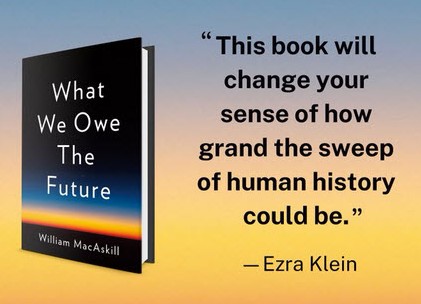File:What we owe the future 8-5-2022.jpg
What_we_owe_the_future_8-5-2022.jpg (421 × 304 pixels, file size: 32 KB, MIME type: image/jpeg)
What We Owe the Future
By William MacAskill
Oxford University
Publish Date: August 16, 2022
And then there is this -- a counter-narrative review and strongly negative assessment of 'longtermism' ...
From the Publisher:
An Oxford philosopher makes the case for “longtermism” — that positively influencing the long-term future is a key moral priority of our time.
The fate of the world is in our hands. Humanity’s written history spans only five thousand years. Our yet-unwritten future could last for millions more — or it could end tomorrow. Astonishing numbers of people could lead lives of great happiness or unimaginable suffering, or never live at all, depending on what we choose to do today.
In What We Owe The Future, philosopher William MacAskill argues for longtermism, that idea that positively influencing the distant future is a key moral priority of our time. From this perspective, it’s not enough to reverse climate change or avert the next pandemic. We must ensure that civilization would rebound if it collapsed; counter the end of moral progress; and prepare for a planet where the smartest beings are digital, not human.
If we make wise choices today, our grandchildren’s grandchildren will thrive, knowing we did everything we could to give them a world full of justice, hope and beauty.
Thread
William MacAskill @willmacaskill
Apr 29
How would our priorities change if we truly took future lives as seriously as our own?
What We Owe The Future explores crucial questions about our long-term future, ranging from history to philosophy to economics to technology, such as:
What can we learn from previous social movements, such as the abolition of slavery, about changing society’s values for the better? And in general, how historically contingent is moral progress?
How likely is a global civilisational collapse, and would we recover from one? Could rapid advancements in artificial intelligence “lock in” our values this century for future generations?
Are we at risk of technological stagnation, and what does this mean for our ability to tackle risks of extinction and collapse from engineered pandemics, nuclear weapons, and extreme climate change?
Do we make the world better by bringing more happy people into existence? Will the future be good or bad, on balance?
Is this the most important century for the long-term future? How can we best use our careers and resources to leave our grandchildren’s grandchildren a world of justice, hope, and beauty?
This matters so much because the future is *big*. If humanity avoids collapse or extinction and lasts just as long as a typical mammalian species, future lives will outnumber us ten thousand to one.
The Future is Vast: Longtermism’s perspective on humanity’s past, present, and future
If we manage to avoid a large catastrophe, we are living at the early beginnings of human history.
And crucially, the nature of these lives — whether they will be flourishing or miserable, egalitarian or oppressed, or whether or not they will exist at all— might well be determined by what happens this century.
That’s the case for longtermism in a nutshell: future people count, there could be a lot of them, and we can make their lives go better.
My tentative hope is that What We Owe The Future will be like Animal Liberation but for future generations: impacting broadly how society thinks about the interests of future people, and inspiring us to take action to safeguard the long term.
○
File history
Click on a date/time to view the file as it appeared at that time.
| Date/Time | Thumbnail | Dimensions | User | Comment | |
|---|---|---|---|---|---|
| current | 16:07, 7 August 2022 |  | 421 × 304 (32 KB) | Siterunner (talk | contribs) |
You cannot overwrite this file.
File usage
The following page uses this file:
- Anthropocene
- Atmospheric Science
- Biodiversity
- Biomimicry
- Climate Change
- Climate Policy
- Democracy
- Earth360
- Earth System Science
- Ecology Studies
- Eco-nomics
- Eco-Spirituality
- Endangered Species
- Environmental Protection
- Environmental Security
- Environmental Security, National Security
- Environmental Full-cost Accounting
- Global Warming
- Green Graphics
- Green Politics
- Green Values
- Media
- Money in Politics
- Nature
- New Definitions of National Security
- Nuclear Weapons
- Planet Citizen
- Planet Citizens
- Planet Citizens, Planet Scientists
- Renewable Energy
- Resilience
- Social Justice
- Strategic Demands
- Sustainability Policies
- ThinBlueLayer
